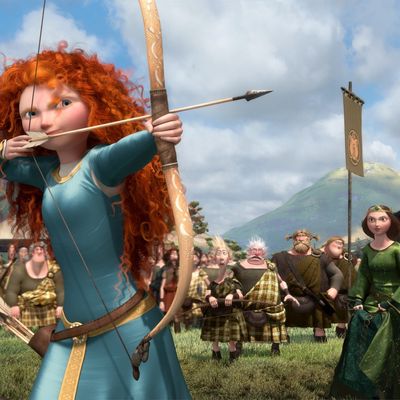
The generic title and mythic-female-empowerment posters for Brave don’t prepare you for the rollicking Pixar comedy to come, a slapstick mother-daughter-rivalry farce that’s at its most moving in mid-mayhem. Has Pixar’s association with Disney softened its spine? The first act is misleadingly humdrum, as the flame-haired princess Merida strives to do what medieval Scottish lassies mustn’t, like shooting arrows and letting her mass of curls flow free. As the girl gallops past wild crags, Julie Fowlis sings a song called “Touch the Sky”: “I will ride! I will fly! Chase the wind and touch the sky” and so on. It looks to be a long, Disneyish haul. But then the good comic bits come thick and fast, among them the noisy arrival of three suitors from rival clans, each more hilariously unprepossessing than the last, and the pranks of the heroine’s three little brothers, who whack off half the mustache of a snoozing guard with an ax.
Finally—rather late—comes the delightful main arc (which the film’s publicists insist is a spoiler!, so if you want to remain ignorant, skip the rest of this and the next paragraph). Obtaining a spell from a witch to change her repressive mother’s mind about marrying her off to one of the chuckleheads, Merida changes her mother into a large and discombobulated bear, the very creature that drives her husband, the lord (who lost a leg to an especially nasty one years earlier), into a frenzy of bloodlust. So Merida must use her physical resources and wiles to keep her mum from being killed and having her head mounted over her own throne.
The film has three directors — Mark Andrews, Brenda Chapman, and Steve Purcell — and whoever was in charge of the scenes between Merida and her mother the bear deserves a celebratory blast of the pig-head horn that heralds the coming of the clans. For a while, the ursine Queen Elinor attempts to maintain her ladylike dignity, to the point where her daughter has to teach her how to catch salmon from a rushing stream, the bear then insisting it be cooked and properly plated. Sadly, the emergence of Elinor’s bear-dexterity means a lessening in her human-motherly instincts, to the point where it’s unclear if she’ll coddle or consume her traumatized daughter.
Kelly Macdonald is an inspired choice to voice Merida, having a tone that is at once dulcet and exasperated. You can see the Miyazaki influence in the glowing will-o’-the-wisps that lead the girl in the direction of her destiny, and in the longed-for transformation of a parent that turns almost instantly into a disaster to be overcome. But this is Pixar-ellated Miyazaki, rich in riotous incongruities, and building to a scene in a banquet hall in which all the movie’s disparate elements—farce, sentiment, and wicked suspense — come together, the brutal Scotsmen poised to interrupt a sacred mother-daughter reconciliation with a hail of arrows.
In addition to being fast, funny, and unpretentious, Brave is a happy antidote to all the recent films in which women triumph by besting men at their own macho games, as if the history of male dominance is one of patriarchs suppressing females’ essential warlike nature. Merida wants nothing more than to control her own fate, her rage provoked by the refusal of her mother — for whom duty and subservience are paramount — to see the world through her eyes. Why surrender her will to silly, drunken, endlessly combative men when there’s so much to see and do? Her boo-boo at least has the effect of giving her and her mother a common cause, which is certainly a more direct route to mutual understanding than tens of thousands of dollars of therapy.
This article originally appeared on nymag.com.


